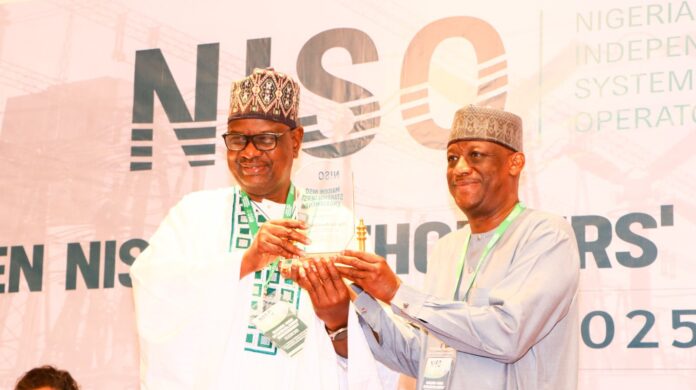The Nigerian Independent System Operator (NISO) has restated its commitment to delivering on mandate to fostering fairness, transparency and resilience in the Nigeria’s electricity sector while calling for collaboration with stakeholders to drive competitive market.
This is as the Minister of Power, Adebayo Adelabu, re-echoed the importance of partnerships across the value chain including operators, generation companies, transmission service providers, distribution licensees, regulators, market participants, state government, stating that no single institution can deliver a stable and efficient power sector in isolation.
Adelabu spoke on Wednesday in Abuja at the Stakeholders Engagement Forum organised by NISO which has it theme as “Building a Resilient and Competitive Electricity Market – The Role of NISO.” The event features key figures including ministers, board chairman, executive directors of institutions, industry experts and press representatives.
According to the minister, “Progress depends on collective responsibility, adherence to established procedures, and continuous communication among all stakeholders and recent events in the sector have demonstrated the importance of strong coordination.”
This collaboration, he said underscores the Federal Government’s unwavering commitment, under the Renewed Hope Agenda of President Bola Ahmed Tinubu, GCFR, to deepen power sector reforms, attract private investment, and unlock the vast renewable energy potential within our states and communities.
“The power sector remains a cornerstone of our national economic transformation plan, and our vision is clear: to deliver stable, affordable, and sustainable electricity that drives industrialization, creates jobs, and promotes inclusive growth across all regions of Nigeria,” he declared.
He congratulated the NISO for the successful grid synchronisation test conducted on November 8, 2025 with the West African Power Pool (WAPP), highlighting disciplined operations, improved communication protocols, and strengthened technical capacity as key factor for the positive results.
Speaking on the gains, the minister said: “The benefits of synchronisation with other WAPP countries would extend directly to the Nigerian people. A more stable grid improves the performance of essential services such as hospitals, water supply, transport systems, digital infrastructure, and public institutions. As ongoing transmission expansion projects including the North-Core line, the Ajegunle 330 kV Substation, the Kaduna–Kano transmission upgrades, and the Gwagwalada–Gurara connection are completed, synchronisation will help deliver more reliable power to homes and industries nationwide. While expectations must remain realistic, this achievement provides the structural foundation for the improvements Nigerians have long awaited.
“The government expect long-term benefits for Nigeria’s economy. Regional integration will enable the country to optimise generation costs, deepen industrialisation, strengthen regulatory oversight, and expand its leadership in the ECOWAS energy landscape. It will also support ongoing domestic reforms that allow states to participate in the generation, transmission, and distribution of electricity within a more stable national framework.”
In addition, Adelabu highlighted critical milestones recorded in the Nigeria power sector under the current administration which included: Decentralization and liberalization of the sector leading to fifteen activated state electricity markets following the Electricity Act 2023; Development of a National Integrated Electricity Policy after 24 years; Over $2 billion in fresh investments to enhance electricity access; Transitioning to full commercialization, increasing sector’s revenue by 70% in 2024; An
Increase in the country’s installed capacity for energy generation from 13GW to 14GW and attaining a peak generation of 5,801.44 MW and a maximum daily energy record of 128,370.75 MWh on March 4, 2025; and
Successful mobilization of N700 billion funding from FAAC to implement the Presidential Metering Initiative, aimed at tackling the sector’s long-standing metering gap. This is complemented by the World Bank DISREP fund of $500m adding 3.45m meters to the sector.
“Procurement of the meters have commenced,” he said.
In his opening remarks, the Managing Director/CEO of NISO, Emgr. Abdu Muhammed reaffirmed NISO commitment to building a stakeholder-driven market architecture, with mandate anchored on five principles: Transparency in market and system operations, Neutrality in all market decisions, Operational discipline based on international standards, Fair allocation of responsibilities, and Open and continuous engagement with stakeholders.
“Nigeria’s electricity market will only be as competitive as the systems that support it. Competition thrives where rules are clear, processes are predictable, and all participants have equal access to opportunities. This is the market NISO is determined to build.
“The Nigerian Electricity Supply Industry is transitioning from excuses to accountability. We are moving from opacity to transparency, from fragmented coordination to unified command and control, from reactive operations to strategic market evolution. But we cannot do it alone,” he said.
Mohammed also commended Minister of Power and all industry stakeholders – especially the NERC, Gencos, TCN and the DisCos – for their cooperation, professionalism, and collaboration during the recent successful synchronization trial of the Nigerian grid with the West African Power Pool (WAPP) interconnected regional grid.
This achievement, he agreed was not the effort of one institution; but was the result of collective dedication across the entire value chain – from system operations, TCN teams, and generation and distribution coordination, to support from gas suppliers, regulators, and market participants.
“Your contributions affirmed what we can accomplish when the industry works together with a shared purpose. NISO deeply values this spirit of partnership, and we look forward to building on it as we advance grid stability and regional market integration,” he added.

